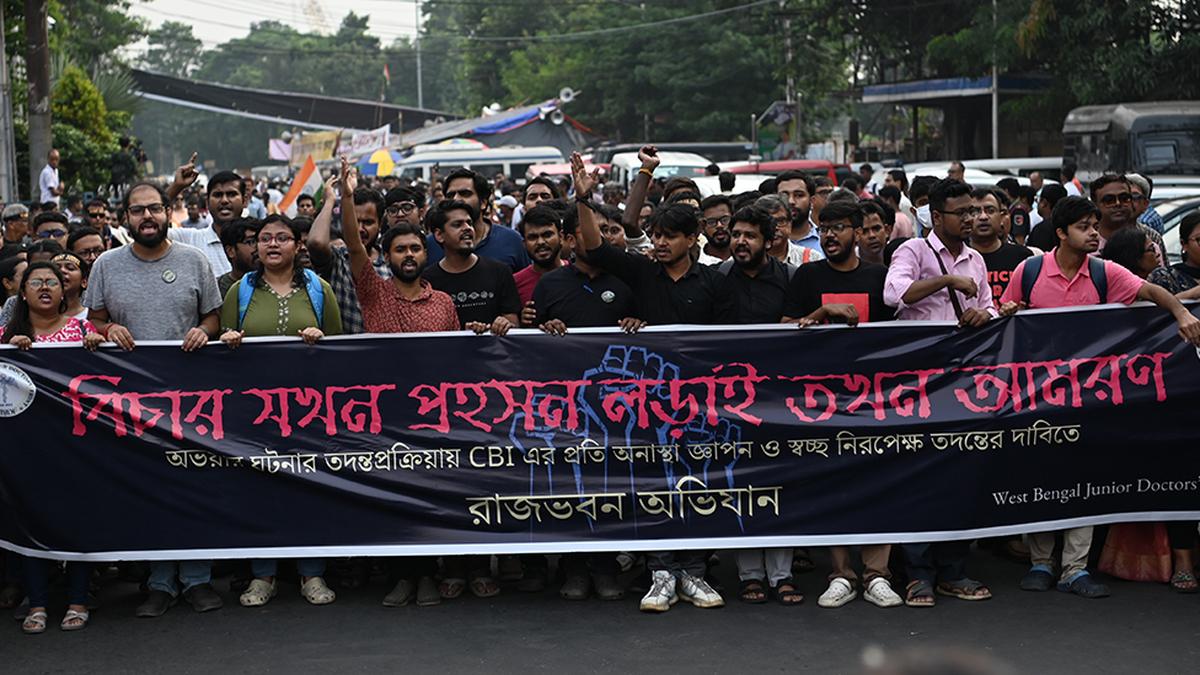Junior doctors marched towards the Raj Bhavan to demand justice in the rape-murder case of a trainee doctor at the RG Kar Medical College and Hospital in Kolkata.
| Photo Credit: DEBASISH BHADURI
On February 7, the Calcutta High Court rejected the West Bengal government’s appeal seeking the death penalty for the man convicted for the rape and murder case of a woman at the R.G. Kar Medical Hospital in Kolkata last year. However, the Court admitted a separate appeal, also demanding the death penalty, by the Central Bureau of Investigation (CBI), which investigated the case.
Faced with widespread and prolonged protests after the gruesome incident on August 9, 2024, the West Bengal government was the first to demand the death penalty for the convict. About a month after the incident, it passed the Aparajita Women and Child (West Bengal Criminal Laws Amendment) Bill, 2024, in the State Assembly, which contains provisions for the death penalty in almost all cases involving rape. The Bill is awaiting a nod from the Union government.
However, on January 20, the Additional District and Sessions Judge of Sealdah, Anirban Das, spared the convict of the noose, stating that the crime does not fall in the category of ‘rarest of rare’ crimes. While awarding the convict life imprisonment, the judge argued that the duty of the court was not to match “brutality with brutality”, but to elevate humanity through wisdom, compassion, and a deeper understanding of justice. “In the realm of modern justice, we must rise above the primitive instinct of ‘an eye for an eye’ or ‘a tooth for a tooth’ or ‘nail for a nail’ or ‘a life for a life,’” he noted in the order. The judge added that the court must resist the temptation of bowing to public pressure or emotional appeals.
The judgment was criticised by many people for noting that the crime, which involved extreme brutality, did not fall under the ‘rarest of rare’ category, and there was a clamour again for the death sentence. Within a week, the State government and the CBI argued before the High Court that their petition seeking capital punishment for the convict be heard. Chief Minister Mamata Banerjee stated that if the Kolkata Police had investigated the crime, they would have been able to convince the Court to award the death penalty. “If someone is a monster, how can society show humanity? Society must be made humane towards our mothers and sisters,” she said.
Ever since the rape and murder of the postgraduate trainee doctor at R.G. Kar Medical Hospital, there have been at least three incidents involving the rape and murder of minors in which the death sentence has been awarded to the convicts. Officials of the State government and leaders of the ruling Trinamool Congress have been highlighting these sentences to argue that the police and trial courts have quickly delivered justice in cases involving sexual assault. While inordinate delays in investigation and trial often frustrates the faith of the people in the judicial system (justice delayed is justice denied), hurried investigations and trials can be equally dangerous (justice hurried is justice buried).
The Justice J.S. Verma Committee, formed in 2012 to reform laws related to sexual assault in India, was not inclined to recommend the death penalty for rape even in the ‘rarest of rare’ cases. The Committee had pointed out that “there is considerable evidence that the deterrent effect of the death penalty on serious crimes is actually a myth”.
Tackling crimes against women requires a multi-pronged strategy. This includes better policing and ensuring safer workplaces for women. It was shocking that the convict in the R.G. Kar case, a civic police volunteer, had walked into the seminar room of the State-run health facility in the dead of the night without facing any checks at the hospital gates. Is is a fact that hardly any background checks are conducted while recruiting contractual staff, who are entrusted with helping the law establishment discharge their duties. These are the issues that need urgent redress and were in fact some of the demands of the protesters who had hit the streets last August. Even the parents of the victim believe that the death penalty is not the only way to ensure justice. They have said that they want the investigative agencies to look at the “larger conspiracy” and are seeking punishment for others involved in the crime.
The death penalty is a quick-fix approach adopted by governments to quell anger and protests. The trial court judge had rightly recognised and resisted it.
Published – February 10, 2025 12:26 am IST
